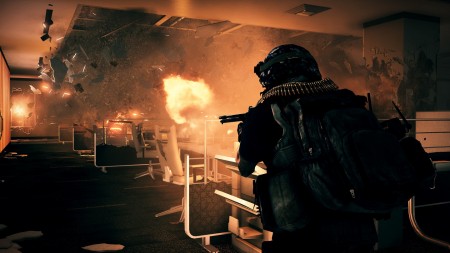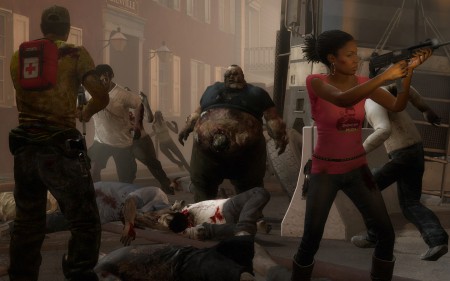The Comrade Principle: Going Through It Alone Just Doesn’t Cut It Anymore.
Competition; it’s hard-wired into many of us at a biological level. Everything we do has a competitive edge, whether it is immediately obvious or not. This has never been more true than in gaming, and more specifically, online gaming.
There has however been a subtle paradigm shift in how competition is presented and ultimately, enjoyed by the gaming public.
It could be argued that it all started with Doom and it’s revolutionary dial-up deathmatch mode. It was an absolute pain in the proverbial to get going, often taking up to an hour to set up (using landlines- this pre-dates the invention of broadband kids…), but it was worth every effort. Doom’s already visceral combat was immensely enhanced by having another person coming after you. That was my first taste of competitive online play and I loved it.
A number of developers cottoned onto this and from then on many games had an online element which at the time may have seemed like an odd idea – especially given the single-player focus the main campaigns had. In fact, it probably wasn’t until the likes of the great deathmatch modes in Quake arrived that the penny dropped for many; online gameplay was not just something to add on to tick a box, but something that could stand alone as an experience all by itself.
The most obvious example would be the evolution of the Call of Duty series. Initially this was a singleplayer game by design, with multiplayer components tagged on in an almost ad hoc fashion. The series though has evolved into a game that arguably, has the multiplayer part as the focus of the game itself, with the single player portion acting as a brief spectacle to hop-through before jumping online. This series also introduced the idea of a persistent online ‘character’, with the associated progression to the masses taking it beyond what Battlefield 2 achieved. Customisation, loadouts and achievements were also blooded in this arena and honed, largely, to what they are today. Many people lambast the Call of Duty series, especially for it’s derivative and (lately) uninspiring single player campaigns, but you cannot argue the effect it has had on the online gaming space. It has had far reaching impacts outside it’s own genre and could be said to have defined a generation of online players, for better or for worse.
The next evolution of the online space is coming forward in the shape of the ‘free’ to play business model. this model is of course, not actually free, past the lack of an initial purchase, but it is still a good gateway into many of the games, their worlds and the associated online communities that are popping up. Micro-transactions are what turn the profit here, and again, this is something that was largely demonstrated by Valve (both the change from a paid game to the Free to Play model of Team Fortress 2, and the associated micro-transactions) and then quickly aped by the rest of the industry. There was initially a slow uptake on this model, but we are seeing more and more games and publishers turn to it as the margins on such a model become more apparent. It’s risky for sure, there’s a far greater chance of catastrophic failure, given the development outlay will not be recouped immediately by ‘box’ sales, but in the continued playing and use of micro-transactions, but the longer-term financial benefits are huge. Further it offers us, the customer, better value for our money and the producers are heavily incentivised to ensure the quality of the game at launch- if it’s sub par people just won’t stick around and if people aren’t playing, they aren’t paying.
Planetside 2 is possibly the biggest online shooter to adopt this model and as far as I can tell, is doing very well because of it. It also perhaps marks a slight shift in the style of online play, I’ve certainly noticed a shift though, both in how I play competitively online and in the modes provided by the games themselves and I think it started, for me, with Valve’s Left 4 Dead.
Valve managed to crack the magic formula that made co-operative play just as fun, exciting and addictive as competitive play. It still amazes me that nobody managed this before them, but Valve got there first and then cemented that position with the equally good Left 4 Dead 2. This game (and arguably Counter-Strike before it) has changed the way I view online gaming. Now, I don’t go looking for a death-match mode, trying to beat all my opponents- but for a co-operative mode where much more exciting situations can be found. In when wanting a slice of competitive death-match I do tend to go for games like Team Fortress 2 where there’s another element involved (such as collectables and a degree of character progression).
Sure it’s fun getting a decent kill streak and hitting the top of the leader-board, but it’s more fun rescuing a team-mate from certain death before tipping the battle in your favour. These kinds of encounters are where memorable stories and more importantly, friends are made. this is increasingly being echoed in other games. Some of the engagements in Battlefield 3 are epic, jet’s roaring overhead, armour pounding forward emplacements and infantry rushing the lines to the left and the right. You feel part of the scene, an important part, and although you’re not the lone gunman, the hero of the hour, you’re an integral part and enjoy the moment even more for it.
These are the eponymous water-cooler moments that make online cooperative play the superb experience it is. The unscripted nature of the encounters are guaranteed by the inclusion of other players (who are inherently, unpredictable) and you simply cannot have the same level of emotional investment, as when you are playing with or against someone you strongly suspect is a human too…
I’ve had moments in L4D2’s elite mode where a we’ve pulled an almost total wipe back from the brink held our own, fought off the horde and managed an escape with barely any health under the cover of Molotov’s into the safe room. the team were cheering down their mikes.
Counter-Strike too; pulling off that perfectly orchestrated assault on the, erm, CS_assault level and wiping out the terrorists in a beautifully coordinated attack using feints, flash bangs, smoke bombs and an sneak attack using the vent.
Then we come to Planetside 2. Ever wanted to know what it was like to be on the sticky end of a superior attack. Desperately holding off wave after wave of enemies, while being told, constantly to hold on as reinforcements are on their way. The feeling when they arrive and the battle turns- you’re on the offensive now- the war has shifted. The feeling works just as well if you are the reinforcements, busting a gut to save you friends and team-mates, the coordinated APCs, the air cover. the lots and lots of hiding. It’s more visceral, more real and more enjoyable because you know the person next to you is going through exactly the same thing and has exactly the same goals.
I’ve made some of my best friends through online gaming, some I’ve known for decades. Other friends I’ve introduced to it and the bond has grown closer. If it’s not something that’s currently a main part of your gaming diet, I urge you to try it; you’re missing out on some of the best experiences gaming has to offer.
Here’s hoping the recent Valve rumours are true- another Left 4 Dead (in a new source engine) is just around the corner; it’s just what I need about now…

